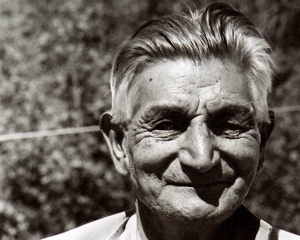
The Kyrie is sung at almost every Catholic mass, as it is part of the Ordinary of the Mass. These texts remain the same regardless of the Feast Day or date in the liturgical calendar. Because parishioners would be familiar with it, it was traditionally set to more ornate music. Thus, the text-setting is melismatic – many pitches to each syllable.
This field recording was collected by Ronnie MacEachern in 1978.
Kyrie, 1978. Noel Pol Denny. T-1076. Beaton Institute, Cape Breton University.
Artist
Noel P. Denny
Noel P. Denny was born in February, 1910, and was the son of Peter Denny of Eskasoni and Helen (Sylliboy) Denny. Noel was known as Noel Pol and was a kind and well respected elder of Eskasoni. He was the brother of the late Annie Cremo, and like Annie and others within his family, he was well versed in Mi’kmaq Prayers and traditional Mi’kmaw songs. He was well known for singing Ko’jua, the traditional Mi’kmaw dance song and he shared his knowledge of traditional songs and prayers with anyone wishing to learn. Ko’jua is a song genre meant to encourage everyone to come on the floor and dance. This song is significant to Mi’kmaw social gatherings and is still widely sung today.
Noel Pol died on March 26, 1981 at the age of 71.
Lyrics
Kyrie
Niskam ewlite’tmin
Niskam ewlite’tmin
Se’sus ewlite’tmin
Se’sus ewlite’tmin
Niskam ewlite’tmin
Se’sus ewlite’tmin
Translation
God, feel sorry for us
God, feel sorry for us
Jesus, feel sorry for us
Jesus, feel sorry for us
God, feel sorry for us
Jesus, feel sorry for us
Materials
Materials
Links
Links
- Atlantic Canada’s First Nation Help Desk
- Beaton Institute: Ethnocultural Resources Inventory
- Micmac News (1965-1991)
- Mi’kmaq Association for Cultural Studies
- Mi’kmaq College Institute
- Mi’kmaq Resource Centre
- Native Dance: Mi’kmaq
- Nova Scotia Museum; Mi’kmaq Portraits Collection
- NSARM: Mi’kmaq Holdings Resource Guide
- Welta’q – “It Sounds Good”: Historic Recordings of the Mi’kmaq